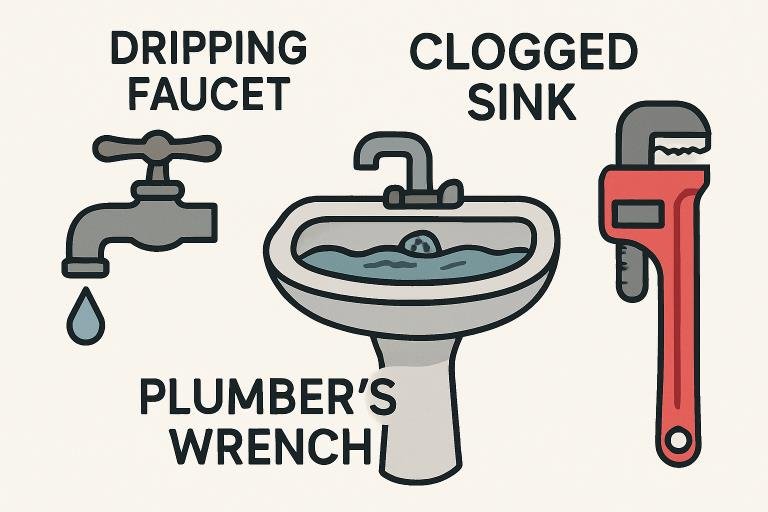Key Takeaways
- Minor plumbing issues can escalate quickly if left unattended—prompt action saves both time and money.
- Most common plumbing problems can be fixed with basic tools and a little knowledge.
- Preventive maintenance is the best way to avoid unexpected breakdowns and costly repairs.
- Know when to call a professional: persistent, widespread, or severe problems should be left to experts.
Homeowners are bound to encounter plumbing issues over time, sometimes turning minor inconveniences into major headaches if left unaddressed. Understanding the most common plumbing problems and how to address them not only helps keep your home running smoothly but can also save you significant expenses on repairs. For expert advice and services when DIY fixes aren’t enough, it’s wise to connect with trusted plumbing experts.
This guide addresses the most common plumbing challenges encountered in homes, offers practical solutions, and provides expert prevention tips to keep your plumbing system in optimal condition. By staying informed, you can tackle many common problems yourself—and know when to call in the professionals.
Frequent plumbing issues include dripping faucets, clogged drains, running toilets, low water pressure, leaky pipes, water heater troubles, and even sewer backups. Each concern, if promptly addressed, can reduce stress and prevent costly damage down the line.
Dripping Faucets
A persistently dripping faucet isn’t merely irritating. It can waste hundreds of gallons of water each year, driving up your utility bills. Most often, the problem lies with a worn-out washer or O-ring inside the faucet handle. Replacing the faulty parts is a straightforward fix for most homeowners. For a detailed, step-by-step guide on how to stop kitchen faucet leaks, including tips on identifying the exact source of the drip, refer to This Old House. Regularly inspecting and maintaining faucet hardware helps ensure long-term performance and conservation. When simple replacements don’t solve the issue, mineral deposits or corroded valve seats might be to blame, and consulting a licensed plumber is recommended.
Clogged Drains
Kitchen and bathroom drains tend to clog due to the accumulation of hair, soap residue, grease, and food particles in the pipes. To keep drains flowing freely, consider using drain guards and regularly cleaning stoppers. Never pour oils or fats down your sink, as these solidify in pipes over time.
When blockages occur, a plunger may do the trick. For tougher clogs, a plumber’s snake or chemical cleaners can be used sparingly. However, repeated chronic clogs may indicate deeper issues within your plumbing system, such as tree roots or pipe damage, which warrant professional attention.
Running Toilets
A running toilet can silently rack up your water bill, wasting as much as 200 gallons of water per day. The main culprits are usually a faulty flapper valve, a worn fill tube, or an imbalanced float. Replacing these inexpensive parts can often resolve the issue with just a few simple tools.
If water continues running after these repairs, mineral deposits in the tank or pipes could be contributing to the malfunction. In such cases, seeking the advice of a qualified plumber ensures the problem is resolved at its source.
Low Water Pressure
Low water pressure, whether in the shower or at the tap, makes daily tasks frustrating. Mineral buildup in faucet aerators and showerheads is a frequent cause, and cleaning or replacing these components often restores proper flow. According to The Spruce, if cleaning doesn’t help, the issue could be a pipe leak or a problem with the municipal water supply. Persistent, house-wide water pressure issues may signal hidden leaks or corroded plumbing, both of which should be inspected and repaired by a professional.
Leaky Pipes
Even a tiny leak can cause major damage over time, ruining walls, ceilings, and flooring, and promoting mold growth. Most leaks are caused by joint deterioration, corrosion, or excessive water pressure. Monthly inspections of visible pipes and hidden areas—such as under sinks and behind appliances —can help catch leaks early.
Minor leaks can often be patched with commercial sealants, but these quick fixes are temporary. Replacing damaged pipe sections or joints provides a longer-term solution and helps ensure the reliability of your plumbing.
Water Heater Issues
Fluctuating water temperatures and a lack of hot water often indicate water heater difficulties, which can be caused by sediment buildup, malfunctioning thermostats, or corroded heating elements. Regularly flushing your water heater tank once a year helps clear sediment and boost efficiency, while periodic checks of thermostats and valves can help prevent more significant issues.
When maintenance doesn’t restore normal function, consult a professional to assess for more serious problems, such as tank leaks or faulty components that require specialized repairs.
Sewer System Backup
Multiple clogged drains, strong sewage odors, or water pooling around basement drains indicate a potential sewer backup, a hazardous and complex problem. Causes can range from pipe blockages to invasive tree roots in sewer lines. If you notice these signs, address the problem immediately to prevent contamination and structural damage. For more guidance on handling a sewer backup, see this resource from This Old House. Sewer issues are best handled by licensed professionals who are equipped to diagnose and remediate problems safely and efficiently.
Preventative Maintenance Tips
Routine Tips
- Visually inspect exposed pipes, faucets, and appliances monthly for leaks or corrosion.
- Clear drain stoppers and use strainers to prevent blockages.
- Flush sinks and toilets with hot water regularly to move buildup before it becomes a blockage.
- Schedule professional plumbing check-ups at least once a year to detect hidden issues.
Emergency Preparedness
- Know the location of your main water shutoff valve.
- Keep plumbing tools and essential supplies on hand for minor emergencies.
- Have a trusted plumber available in case immediate assistance is needed.
Keeping ahead of plumbing issues through regular maintenance and prompt action when problems arise will protect your home and provide invaluable peace of mind. Whether you’re handling more minor fixes yourself or calling in seasoned professionals, prompt intervention always pays off.



